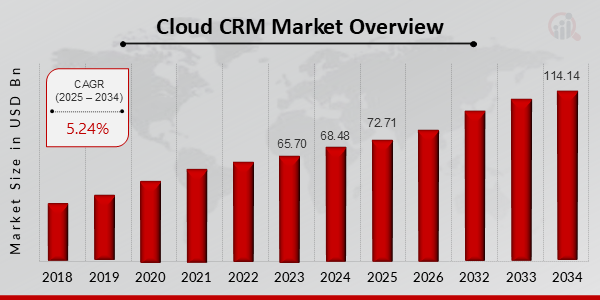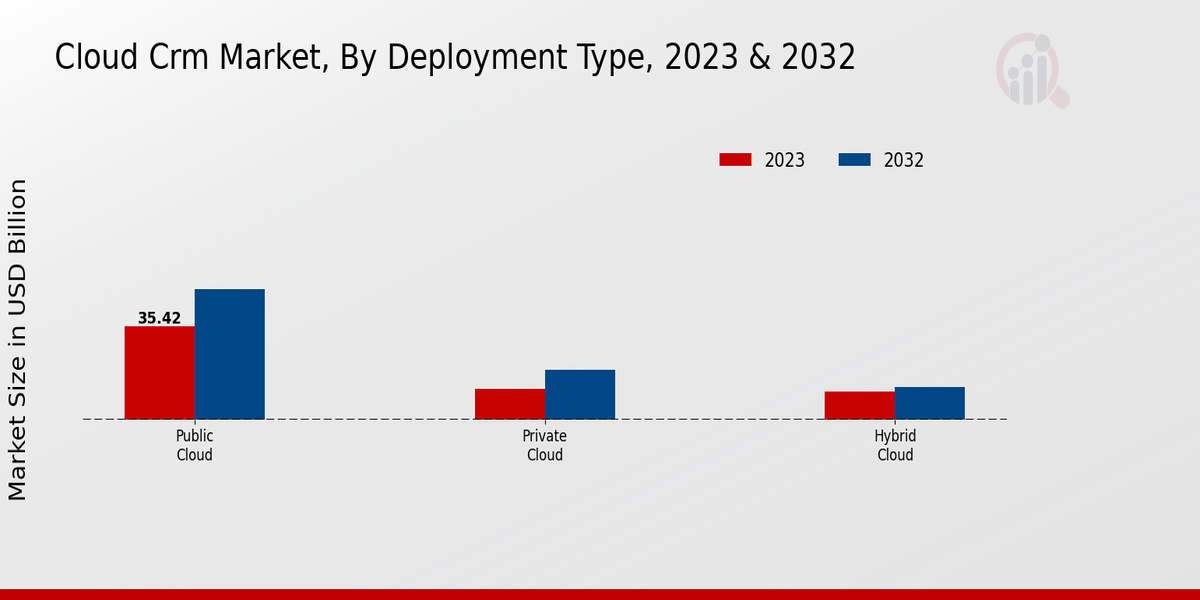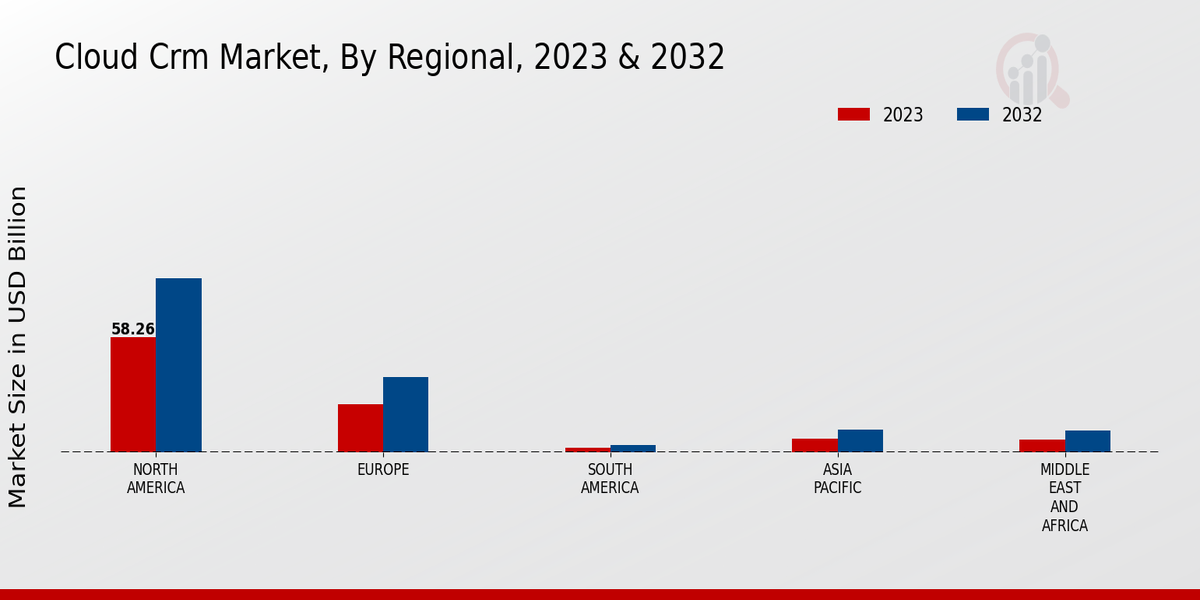Cloud CRM Market Overview
Cloud Crm Market is projected to grow from USD 72.71 Billion in 2025 to USD 114.14 Billion by 2034, exhibiting a compound annual growth rate (CAGR) of 5.24% during the forecast period (2025 - 2034). Additionally, the market size for Cloud Crm Market was valued at USD 68.48 billion in 2024.
Key Cloud CRM Market Trends Highlighted
With the help of advancing technologies, the Cloud CRM market continues to get new clients. The major factors fuelling the growth are a rise in customer expectations, a greater need for data, and better efficiency. The shift to work from home has further expedited the uptake of cloud-based CRM solutions.
Recent developments noted in the Cloud CRM market are advanced by applications of artificial intelligence (AI) and machine learning (ML) to replace human resources in the performance of some activities as well as in enhancing individual experiences. Businesses are also adopting social CRM, which allows engagement with clients to be done via multiple avenues. Further, companies are actively seeking to use CRM for collaboration and revenue generation beyond one single department.
There are subscription opportunities in the Cloud CRM market that are opened by the growth of the market for small and medium enterprises that are yet to tap into CRM systems. The transition to cloud-based environments and technologies, which compel CRM clients to embrace new and even more specialized solutions, is also a window of opportunity for growth. Companies ought to take advantage of these opportunities by examining their present CRM requirements, searching for new technologies and applying systems that support their strategic digital transformation.
Figure 1 Cloud CRM Market Overview (2025-2034)

Source: Primary Research, Secondary Research, MRFR Database and Analyst Review
Cloud CRM Market Drivers
Growing Adoption of Cloud-Based Solutions
The increasing adoption of cloud-based solutions across various industries is a primary driver of the Global Cloud CRM Market Industry. Cloud CRM solutions offer numerous benefits over traditional on-premise CRM systems, including scalability, flexibility, cost-effectiveness, and ease of deployment. As businesses seek to improve their customer relationship management capabilities, they are increasingly turning to cloud-based CRM solutions to gain a competitive edge. The growing popularity of cloud-based solutions is expected to continue driving the growth of the Global Cloud CRM Market Industry in the coming years.
Rising Demand for Customer-Centric Solutions
The increasing focus on customer-centricity is another key driver of the Global Cloud CRM Market Industry. Businesses are recognizing the importance of delivering personalized and seamless customer experiences to drive growth and loyalty. Cloud CRM solutions offer a range of features and capabilities that enable businesses to better understand their customers, track their interactions, and provide personalized experiences across multiple channels. The rising demand for customer-centric solutions is expected to continue fueling the growth of the Global Cloud CRM Market Industry.
Technological Advancements and Innovations
The rapid pace of technological advancements and innovations is also driving the growth of the Global Cloud CRM Market Industry. The emergence of new technologies, such as artificial intelligence (AI), machine learning (ML), and the Internet of Things (IoT), is enabling the development of more sophisticated and intelligent CRM solutions. These solutions can automate tasks, provide real-time insights, and personalize customer experiences to a greater extent than traditional CRM systems. The ongoing advancements in technology are expected to continue driving the growth of the Global Cloud CRM Market Industry.
Cloud CRM Market Segment Insights
Cloud CRM Market Deployment Type Insights
Deployment Type Segment Insights and Overview The Global Cloud CRM Market segmentation by deployment type comprises public cloud, private cloud, and hybrid cloud. Among these, the public cloud segment held the largest market share in 2023 and is projected to maintain its dominance throughout the forecast period. The increasing adoption of Software-as-a-Service (SaaS) and Platform-as-a-Service (PaaS) models, coupled with the flexibility and scalability offered by public cloud solutions, is driving the growth of this segment. The private cloud segment is expected to witness significant growth over the forecast period, owing to the rising demand for secure and customizable CRM solutions.
Private cloud deployments provide organizations with greater control over their data and infrastructure, addressing concerns related to data privacy and security. The hybrid cloud segment is also gaining traction, as it offers a blend of public and private cloud capabilities, allowing organizations to optimize costs and maintain flexibility. The Global Cloud CRM Market revenue from the public cloud segment is projected to reach USD 35.42 billion by 2032, growing at a CAGR of 5.68%. The private cloud segment is expected to grow at a CAGR of 6.12%, reaching a valuation of USD 18.73 billion by 2032.
The hybrid cloud segment is anticipated to have a CAGR of 5.89%, resulting in a market size of USD 12.45 billion by the end of the forecast period. The growth of the Cloud CRM Market is attributed to the rising demand for customer relationship management solutions that can streamline operations, improve customer engagement, and enhance sales effectiveness. The increasing adoption of cloud-based technologies, coupled with the benefits of cost reduction, scalability, and flexibility, is further driving the market expansion. Overall, the Cloud CRM Market is expected to experience robust growth in the coming years, driven by the evolving needs of businesses and the advancements in cloud computing technologies.
Figure 2 Cloud CRM Market Type Insights (2023-2032)

Source: Primary Research, Secondary Research, MRFR Database and Analyst Review
Cloud CRM Market Industry Vertical Insights
The Global Cloud CRM Market is segmented by industry vertical into Automotive, Healthcare, Manufacturing, Retail, and Financial Services. Among these segments, the Healthcare vertical is expected to hold the largest market share in 2023, with a valuation of USD 15.2 billion. This dominance can be attributed to the increasing adoption of cloud-based CRM solutions by healthcare providers to improve patient care, streamline operations, and enhance collaboration among healthcare professionals. The Retail vertical is projected to exhibit significant growth over the forecast period, driven by the rising need for personalized customer experiences and the integration of e-commerce platforms with CRM systems.
The Financial Services vertical is another key segment, where Cloud CRM solutions are gaining traction due to their ability to enhance customer relationships, improve risk management, and streamline compliance processes. Overall, the Global Cloud CRM Market is expected to witness robust growth across all industry verticals, as businesses recognize the benefits of cloud-based CRM solutions in driving operational efficiency, improving customer satisfaction, and gaining a competitive edge.
Cloud CRM Market Business Process Outsourcing Insights
The Business Process Outsourcing segment in the Global Cloud CRM Market is projected to grow significantly in the coming years, driven by the increasing adoption of cloud-based CRM solutions by businesses of all sizes. This growth is attributed to the numerous benefits offered by cloud CRM, including improved efficiency, cost savings, and scalability. Salesforce Management is a key component of the Business Process Outsourcing segment, with a market size of USD 25.44 billion in 2023. It is expected to reach USD 40.63 billion by 2032, growing at a CAGR of 5.6%.
The growth of this segment can be attributed to the increasing adoption of cloud-based CRM solutions by sales teams to manage their customer relationships more effectively. Marketing Automation is another important segment within Business Process Outsourcing, with a market size of USD 18.32 billion in 2023. It is projected to reach USD 30.11 billion by 2032, growing at a CAGR of 6.1%. The growth of this segment is attributed to the increasing adoption of cloud-based CRM solutions by marketing teams to automate their marketing campaigns and improve their customer engagement.
Customer Service Management is a vital segment within Business Process Outsourcing, with a market size of USD 15.67 billion in 2023. It is expected to reach USD 25.23 billion by 2032, growing at a CAGR of 5.9%. The growth of this segment is attributed to the increasing adoption of cloud-based CRM solutions by customer service teams to provide better support to their customers. Project Management is also a significant segment within Business Process Outsourcing, with a market size of USD 12.98 billion in 2023. It is projected to reach USD 21.04 billion by 2032, growing at a CAGR of 6.2%. The growth of this segment is attributed to the increasing adoption of cloud-based CRM solutions by project managers to manage their projects more effectively.
Cloud CRM Market Company Size Insights
The Global Cloud CRM Market is segmented by Company Size into Small and Medium-Sized Enterprises (SMEs) and Large Enterprises. SMEs are expected to hold a larger share of the market in 2023, with a market value of USD 28.2 billion. This is due to the increasing adoption of cloud-based CRM solutions by SMEs, which are looking for cost-effective and scalable solutions to manage their customer relationships. Large Enterprises are also expected to see significant growth in the coming years, with a market value of USD 33.6 billion by 2032. This growth is being driven by the increasing adoption of cloud-based CRM solutions by large enterprises, which are looking to improve their customer service and sales operations.
Cloud CRM Market Regional Insights
The regional segmentation of the Global Cloud CRM Market showcases distinct market dynamics and growth patterns across various geographical regions. North America holds a significant market share, driven by the presence of leading technology providers and early adoption of cloud-based CRM solutions. Europe follows closely, with a mature market and a strong focus on data privacy and security. The APAC region is expected to witness substantial growth due to increasing digital transformation and government initiatives promoting cloud adoption. South America and MEA present emerging markets with growing demand for cloud-based CRM solutions, offering significant growth opportunities. These regional insights highlight the diverse market dynamics and growth potential of the Global Cloud CRM Market.
Figure 3 Cloud CRM Market Regional Insights (2023-2032)

Source: Primary Research, Secondary Research, MRFR Database and Analyst Review
Cloud CRM Market Key Players And Competitive Insights
Major players in the Cloud CRM Market industry are constantly striving to gain a competitive edge by offering innovative solutions and expanding their market presence. Leading Cloud CRM Market players are focusing on strategic partnerships, acquisitions, and product development to strengthen their position in the market. The Cloud CRM Market development landscape is characterized by a mix of established players and emerging startups. These companies are investing heavily in research and development to introduce advanced features and functionalities to cater to the evolving needs of customers. The Cloud CRM Market competitive landscape is expected to remain dynamic in the coming years, with players vying for market share through differentiation and innovation.
Salesforce is a leading provider of cloud-based customer relationship management (CRM) software. The company offers a comprehensive suite of CRM solutions that include sales, marketing, customer service, and analytics. Salesforce has a strong global presence and serves a wide range of industries, including financial services, healthcare, manufacturing, retail, and technology. The company has a strong track record of innovation and has consistently introduced new features and functionalities to its CRM platform. Salesforce is known for its customer-centric approach and its focus on providing a seamless user experience.
Microsoft is another major player in the Cloud CRM Market. The company offers a range of CRM solutions that are part of its Dynamics 365 suite. Microsoft Dynamics 365 CRM is a comprehensive solution that includes sales, marketing, customer service, and analytics. The company has a strong presence in the enterprise market and serves a wide range of industries. Microsoft is known for its strong ecosystem of partners and its focus on providing integrated solutions. The company is investing heavily in artificial intelligence (AI) and machine learning (ML) to enhance the capabilities of its CRM solutions.
Key Companies in the Cloud CRM Market Include
Cloud CRM Market Industry Developments
The global Cloud CRM market is projected to grow from USD 61.82 billion in 2023 to USD 97.9 billion by 2032, at a CAGR of 5.24%. The market growth is attributed to the increasing adoption of cloud-based solutions by businesses of all sizes, the growing need for customer relationship management (CRM) solutions to improve customer engagement and satisfaction, and the rising popularity of artificial intelligence (AI) and machine learning (ML) in CRM systems.
Recent news developments in the Cloud CRM market include the launch of new products and services by major vendors such as Salesforce, Microsoft, and Oracle. For instance, in 2023, Salesforce launched Salesforce Genie, a new customer data platform that unifies customer data from across all channels and systems. Microsoft also announced the general availability of Microsoft Dynamics 365 Customer Insights, a new AI-powered CRM solution that helps businesses gain a deeper understanding of their customers.
Cloud CRM Market Segmentation Insights
-
Cloud CRM Market Deployment Type Outlook
-
Cloud CRM Market Industry Vertical Outlook
-
Cloud CRM Market Business Process Outsourcing Outlook
-
Cloud CRM Market Company Size Outlook
-
Cloud CRM Market Regional Outlook
|
Report Attribute/Metric
|
Details
|
|
Market Size 2024
|
68.48 (USD Billion)
|
|
Market Size 2025
|
72.71 (USD Billion)
|
|
Market Size 2034
|
114.14 (USD Billion)
|
|
Compound Annual Growth Rate (CAGR)
|
5.24% (2025 - 2034)
|
|
Report Coverage
|
Revenue Forecast, Competitive Landscape, Growth Factors, and Trends
|
|
Base Year
|
2024
|
|
Market Forecast Period
|
2025 - 2034
|
|
Historical Data
|
2019 - 2023
|
|
Market Forecast Units
|
USD Billion
|
|
Key Companies Profiled
|
Workday, Infor, Adobe, Oracle, Microsoft, IFS, Epicor, Zoho, SAP, Pegasystems, Salesforce, NetSuite, HubSpot, SugarCRM
|
|
Segments Covered
|
Deployment Type, Industry Vertical, Business Process Outsourcing, Company Size, Regional
|
|
Key Market Opportunities
|
1 Growing adoption of cloud-based technologies2 Increasing need for customer relationship management3 Demand for real-time insights and analytics4 Rise of remote working and distributed teams5 Expansion in emerging markets
|
|
Key Market Dynamics
|
Rising adoption of cloud-based CRM solutions Increasing demand for remote collaboration Growing need for data security and privacy Integration of artificial intelligence AI Emergence of vertical-specific CRM solutions
|
|
Countries Covered
|
North America, Europe, APAC, South America, MEA
|
Frequently Asked Questions (FAQ) :
The Cloud CRM market is anticipated to reach USD 68.48 billion in 2024.
The Cloud CRM market is projected to grow at a CAGR of 5.24% from 2025 to 2034.
North America is expected to hold the largest market share in the Cloud CRM market in 2024.
The BFSI industry is expected to drive the growth of the Cloud CRM market.
Some of the key competitors in the Cloud CRM market include Salesforce, Oracle, Microsoft, SAP, and Adobe.
The key trends driving the growth of the Cloud CRM market include the increasing adoption of cloud computing, the growing need for customer relationship management, and the rising demand for mobile CRM solutions.
The challenges faced by the Cloud CRM market include security concerns, data privacy issues, and the lack of skilled professionals.
Emerging technologies such as artificial intelligence, machine learning, and blockchain are expected to have a significant impact on the Cloud CRM market.
The growth opportunities for the Cloud CRM market include the increasing adoption of cloud computing in emerging markets, the growing demand for mobile CRM solutions, and the rising need for customer relationship management.
The key factors to consider when choosing a Cloud CRM solution include the size of your business, your industry, your budget, and your specific needs.

















